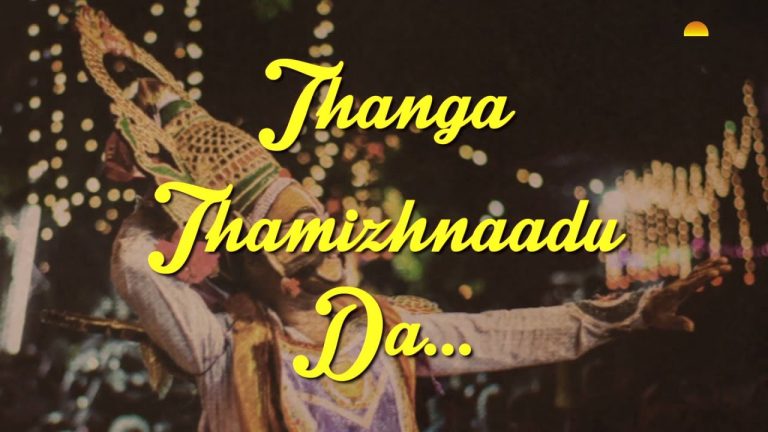
The government order came after the Madurai Bench of Madras High Court said that “There is no statutory or executive order requiring the attendees to stand up when Tamil Thai Vaazhthu is sung.”
By Arun Janardhanan
The Tamil Nadu government has declared Tamil Thai Vaazhthu, a prayer song sung in praise of Mother Tamil, as the State Song.
Chief Minister M K Stalin said on December 17 that a Government Order had been issued directing that everyone who is present during the rendition of the song, barring differently abled persons, should remain standing.
The 55-second song, which is familiar to almost everyone in Tamil Nadu, is sung, like the national anthem, at the beginning of functions in all educational institutions, government offices, public sector undertakings, and similar public events in the state.
The government order has come less than two weeks after the Madurai Bench of Madras High Court said that “There is no statutory or executive order requiring the attendees to stand up when Tamil Thai Vaazhthu is sung.”
The case in High Court
The observations on Tamil Thai Vaazhthu were made by Justice G R Swaminathan in his order passed on December 6 in a petition. The court quashed an FIR registered against a group of individuals led by one Kan. Ilango who had allegedly entered a branch of the Kanchi Mutt in Rameswaram in 2018, raised slogans, and criminally intimidated the manager of the mutt.
The dozen-odd protesters belonged to the Naam Tamilar Katchi (We are Tamilians Party), a Tamil nationalist organization led by activist and filmmaker Senthamizhan Seeman. They were protesting against the Pontiff of the Kanchi Kamakoti Peetam Shri Vijayendra Saraswathi Swamigal who, during a function in Chennai, had remained sitting while Tamil Thai Vaazhthu was played.
The function was held at the Music Academy on January 24, 2018, at which a Tamil-Sanskrit dictionary was released by then Governor of Tamil Nadu, Banwarilal Purohit. Everyone except the Kanchi seer had stood as usual when the invocation song to Mother Tamil was played.
“This triggered considerable outrage,” the court noted. “Lyricist Vairamuthu remarked, ‘National Anthem is to respect the country, Tamil Anthem is to respect Tamil language. Both ought to be respected equally.’”
The court, however, ruled that Tamil Thai Vaazhthu “is a prayer song and not an Anthem” and, while the “highest reverence and respect ought to be shown to Tamil Thaai Vaazhthu”, it was not necessary to stand for it.
Also, “since the petitioner and the de facto complainant have shaken hands, no purpose will be served in keeping the impugned prosecution alive,” the court said. “The impugned FIR stands quashed.”
Reasoning of the court
The court recalled that the Government of Tamil Nadu had, by an order dated June 17, 1970, directed that the song from ‘Manonmaneeyam’, the famous Tamil drama written by P Sundaram Pillai, should be sung as a prayer song at the commencement (and not at the end) of all functions organized by government departments, local bodies and educational institutions.
Subsequently, a memo was issued that the song should be sung in Raaga Mohanam, in the thisra thaalaa, as composed by M S Viswanathan. “Thus, Tamil Thai Vaazhthu is a prayer song and not an anthem,” the court said.
The court also referred to Bijoe Emmanuel vs. State of Kerala (1986), in which the Supreme Court ordered the readmission to school of three children of the Jehovah’s Witnesses, who had been expelled for refusing to sing the national anthem. “It was noted (by the Supreme Court) that there is no provision of law which obliges anyone to sing the National Anthem,” the High Court said.
Again, while the Supreme Court had, in Shyam Narayan Chouksey v. Union of India (2017), directed that all cinema halls shall play the national anthem before the film and all present are obliged to stand, it had modified the original directions and made it “optional and not mandatory”, the High Court said.
The High Court said that while “it is true that the members of the audience conventionally stand up whenever Tamil Thai Vaazhthu is sung, the question is whether this is the only mode in which respect can be shown – When we celebrate pluralism and diversity, insisting that there can be only one way of showing respect reeks of hypocrisy.”
On the alleged disrespect shown by the Pontiff to the song, Justice Swaminathan said: “A Sanyasi primarily leads a life of piety. When in prayer, he is invariably found in a meditative posture. Since Tamil Thai Vaazhthu is a prayer song, a Sanyasi is certainly justified in sitting in a state of meditation. In the instant case, the pontiff is seen sitting in a Dhyana posture with his eyes closed. It was his way of expressing his reverence and respect for Mother Tamil.”
Argument for ‘real’ respect
Justice K Chandru, retired judge of Madras High Court, told that it would be “false respect” if people respected something only by law, and a law that was made for that one person.
“Everyone, 99 per cent of people in the state stand up and show respect to the song without a law. Only one person who thinks that he is above everything says he will not stand. You boycott him, ignore him. Why do you make a law for that one person? If you make it appear like we respect something only by law, that is nothing but a false respect,” Justice Chandru said.
___________________
Courtesy: Indian Express